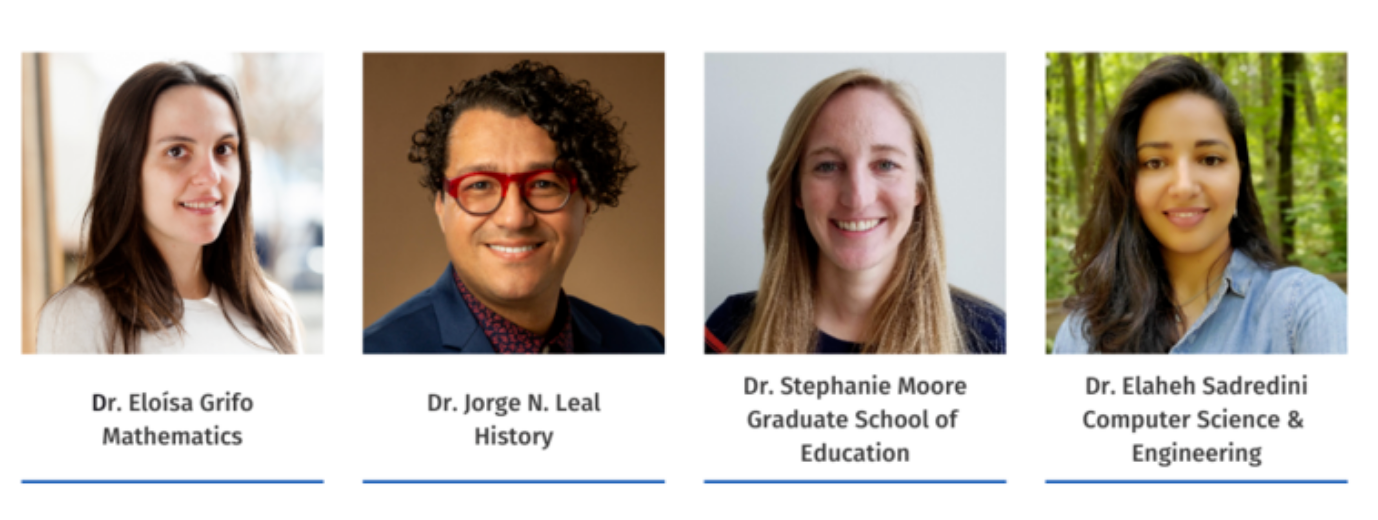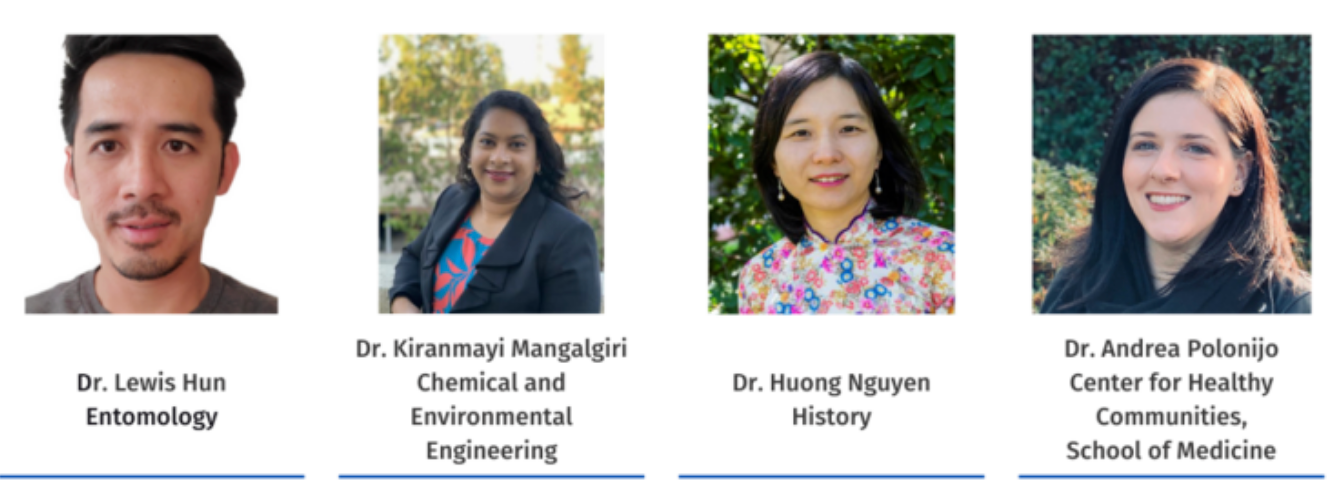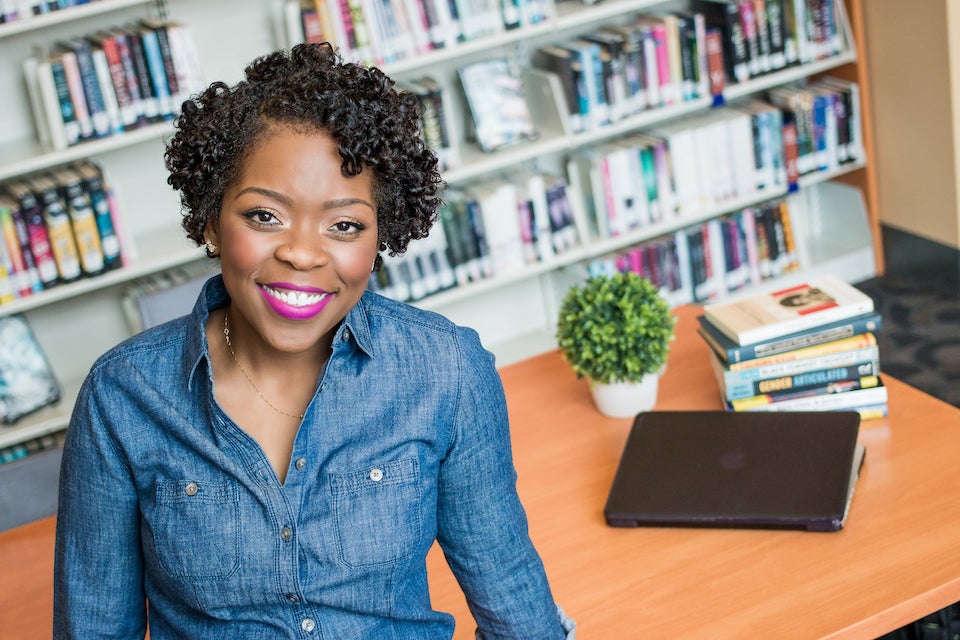Supporting Graduate Students' Academic and Professional Success

GradSuccess held its annual professional development event focused on the academic job market in Week 7 of the Fall 2020 term. Given the scheduling challenges of the pandemic and the universal onset of Zoom fatigue, we chose this year to spread out the panels, workshops, clinics, and keynotes over a full week instead of having everything happen on the same day. If you missed a session or two, read on for the tips and advice that your fellow graduate students found to be most valuable, illuminating, and surprising.
[Image Description: A man stands at a kitchen counter looking at a laptop. He runs his hand down his face in a gesture of fatigue and frustration before frowning at the computer.]
Pictured: All of us, after the seventh zoom session of the day
UCR Faculty Panel
Kicking off the week was a panel of newly hired UCR faculty, including Dr. Eloísa Grifo (Mathematics), Dr. Jorge Leal (History), Dr. Stephanie Moore (Graduate School of Education), and Dr. Elaheh Sadredini (Computer Science & Engineering). The panelists discussed the full range of academic job search experiences, from finding jobs to apply for to applications and interviewing.
[Image Description: Four headshots of new UCR faculty]
Pictured: Your possible future selves
Graduate Writing Center Coordinator Christina Trujillo led a workshop on drafting cover letters for academic positions. She highlighted a number of key points to consider, including the language of the job description as a source to mirror in your letter and the importance of limiting disciplinary jargon and overly wordy or self-undermining language (“I was humbled to be permitted to…”). Also, in trying to determine what to put in your cover letter, it may be helpful to color-code your CV for past accomplishments related to research, to teaching, to service, and in support of diversity as well. This can help to clarify the “evidence” you are using to make your “argument” (the cover letter) for why you are the perfect candidate for a particular job.
Most importantly, Trujillo highlighted the necessity of not relying on a “standard” cover letter for all job applications. Rather, each letter submitted should be tailored to the type and mission of the institution, the needs and specialization(s) of the department, the specific student population to be taught, and your own assessment of how you can contribute to all of the above. It may be helpful to have one or more “template” letters (a template letter for research-focused institutions, a template for teaching-focused liberal arts colleges) prepared that you can then tailor to a particular job relatively quickly.
Academic Job Searches in the Age of COVID: Discovering Opportunities in the Crisis
[Image Description: A headshot of Dr, Christine Kelly]
Pictured: A model of a skilled communicator
Dr. Christine Kelly, Director of the Career Development Office at Claremont Graduate University, also highlighted the importance of tailoring job applications to the specific position and institution in her talk. Recognizing the impact that COVID-19 has had on the academic job market and higher education more generally, Dr. Kelly focused on skills, network, and confidence. First, she brought up the skills that employers consistently rate as most important: adaptability, flexibility, problem solving, and communication. How can you as an applicant demonstrate that you possess these qualities? Well, if you can clearly distill your complicated research in a cover letter and in meetings with faculty, students, and administrators, you demonstrate that you are a skilled communicator. This can help you stand out from other applicants, so be sure to have multiple people, not just your advisor and other grad students in your department, provide feedback on your job materials. (The Graduate Writing Center can be a useful resource in this area: make a consultation appointment at https://ucr.mywconline.com.) Also, as she put it, “let your freak flag fly” – when there are many applicants for a position, what makes you unusual can also help make your application memorable.
[Image Description: A mona looks to the viewer and gestures with her hand for emphases as she says, "I need things to be weird and freaky."]
Pictured: Application reviewers, looking for someone who stands out in their application pool
Dr. Kelly seconded the importance of thinking about your professional network in the most expansive way possible. She noted that moving your circle out to the “third degree” – in other words, friends of friends of friends – is a range far more likely to be productive in a challenging job search. In practice, these are people you don’t know who know people you do know; for instance, acquaintances of friends of your advisor. When applying for a job, if you can determine in advance that someone in the department is in that “third degree,” ask the person you do know to help facilitate an introduction or chat with the person you don’t.
Finally, Dr. Kelly offered a refreshing reminder about maintaining confidence in yourself through what can often be a pretty demoralizing job search process. Part of graduate school is becoming aware of how much you don’t know, which can paradoxically have the effect of making you feel dumber, instead of smarter, as a graduate student. Often, this can produce self-doubt, lead to self-undermining language, or otherwise negatively impact your confidence. However, when you compare yourself to the general population, you’ll see you actually know a lot! So don’t hold yourself to the standard of being your advisor when you go on the job market – no one else is expecting you to be that. Instead, be the best emerging scholar you can be.
Postdoc Panel
[Image Description: Headshots of the four UCR postdoctoral scholars.]
Pictured: The folks who can help shed some light on your future educational journey
Logically enough, advice for navigating the job market as post-graduate student, not-yet-faculty came up during the postdoc panel as well. UCR postdocs Dr. Lewis Hun (Entomology), Dr. Kiranmayi Mangalgiri (Chemical and Environmental Engineering), Dr. Huong Nguyen (History), and Dr. Andrea Polonijo (School of Medicine) joined us for a discussion of how they found their positions, the postdoc experience, and what the postdoctoral job search looks like. They acknowledged that it is natural to be in a graduate student mindset when on the job market, but that you need to begin the process of shifting into thinking of yourself as a potential colleague. Your cover letters and interviews should reflect this shift by focusing on how you can contribute to a given lab, department, and/or institution (rather than how a given opportunity can help you to advance your research, which is more demonstrative of a student mindset).
Having said that, it’s also important to remember that you are interviewing that lab or department as they are interviewing you. Try to find out what the workload and the personal dynamics are like – graduate students are often a less filtered source for this kind of information, so make sure you carve out a chance to speak to a few. Find out about what the place is like to live in, to see if you can really envision yourself there. And, as Dr. Mangalgiri said, make sure they have thought about how they can support your professional development as well.
Several of the postdocs on the panel noted that they had obtained their positions by reaching out, without necessarily waiting for a job description, to labs or specific PIs doing work that they found interesting and aligned with their own research goals. If the PI had funding, this outreach could lead to a postdoc position, either immediately or a year or two further down the line. Dr. Nguyen noted that this was more common in the sciences, and that her own postdoc had been publicly posted and the search process had a lot in common with faculty hiring. She also noted that teaching as a component of a postdoc is more common in the humanities and social sciences.
Keynote: Dr. Shardé Davis
[Image Description: A headshot of Dr. Shardè Davis.]
Pictured: A wealth of knowledge
Dr. Shardé Davis, assistant professor of communication at the University of Connecticut and the creator of #BlackintheIvory, delivered a compelling keynote for the week entitled, “#BlackintheIvory: Amplifying the Voices of Blackademic Truthtellers about Anti-Black Racism.” Using the term “Blackademic” to be inclusive of Black faculty, graduate students, and postdocs, Dr. Davis delivered a powerful analysis of the potential benefits, and very real risks, of taking on the role of “truthteller” when it comes to the white supremacy embedded in the foundations of the academy. She offered hard-won advice for Black graduate students in relation to how to protect themselves and make decisions about when, how, where, and why to share their truth. She also provided valuable suggestions for non-Black members of the academy on the best practices to adopt to make a start on transforming its embedded forms of anti-Black racism.
For fellow Blackademics, she acknowledged the invisible labor expectation that often accompanies Black positionality in the academy and the “racial battle fatigue” that accompanies it. She noted that, even when it is valid and important to engage in truth telling to make change possible, it comes with very real PTSD for those choosing to engage. As such, Black members of the academy should not feel obligated to take up a space, even when it is made available for them, if it feels like they are speaking their truth to an audience that is unreceptive or simply wishes to consume it as spectacle. Dr. Davis suggested that Blackademics turn to spaces such as the Black/Sister Collective (the subject of her research) at those moments to find strength and healing.
For non-Black members of the academy who wish to amplify the voices of Blackademic truthtellers, Dr. Davis first argued for the need to make that requested labor visible, and to compensate it as labor. If you want to “pick their brain” about race relations on campus, be willing to pay for their time and the trauma you are asking that person to engage with. Dr. Davis suggested many innovative forms of compensation for graduate students, including furniture allowances, mental health stipends, meal vouchers, and supporting Black student groups with funding and space. Or better yet, if you want to move beyond performative allyship, do the work yourself by reading the many books and articles available on this subject. Adopt “shine theory” - repeat brilliant ideas by scholars of color and properly attribute the ideas to their originators, in multiple settings and contexts. Along these lines, include more Black authors in graduate course syllabi in all fields, support the hiring of more Black faculty, and spell and pronounce their names correctly. Taken together, she stressed the need to communicate respect for Black academics’ time, ideas, and safety.
[Image Description: Six animated lights blinking on and off in a pattern around the words: Sine on!]
Pictured: A little light shed onto the pathway to your academic career!
One final crucial point that Dr. Davis made was to not be afraid to make mistakes. We are trying to dismantle some very old and powerful structures – we will absolutely make mistakes. But we must also not stop trying. Instead, we must learn from failure (as we do in every other aspect of graduate school) and keep using that new knowledge to do better.



